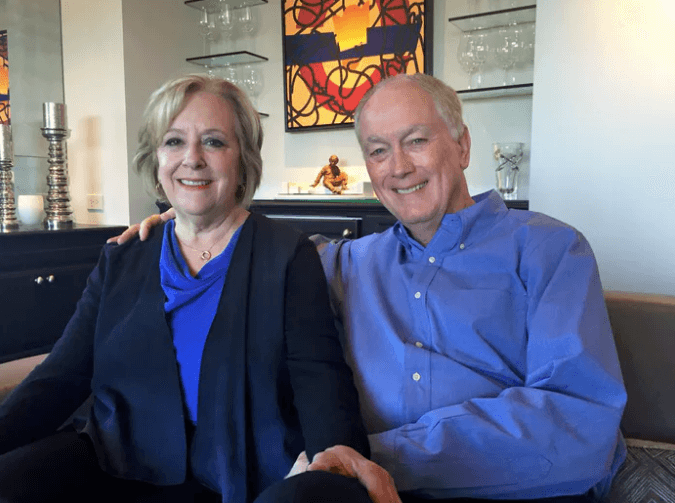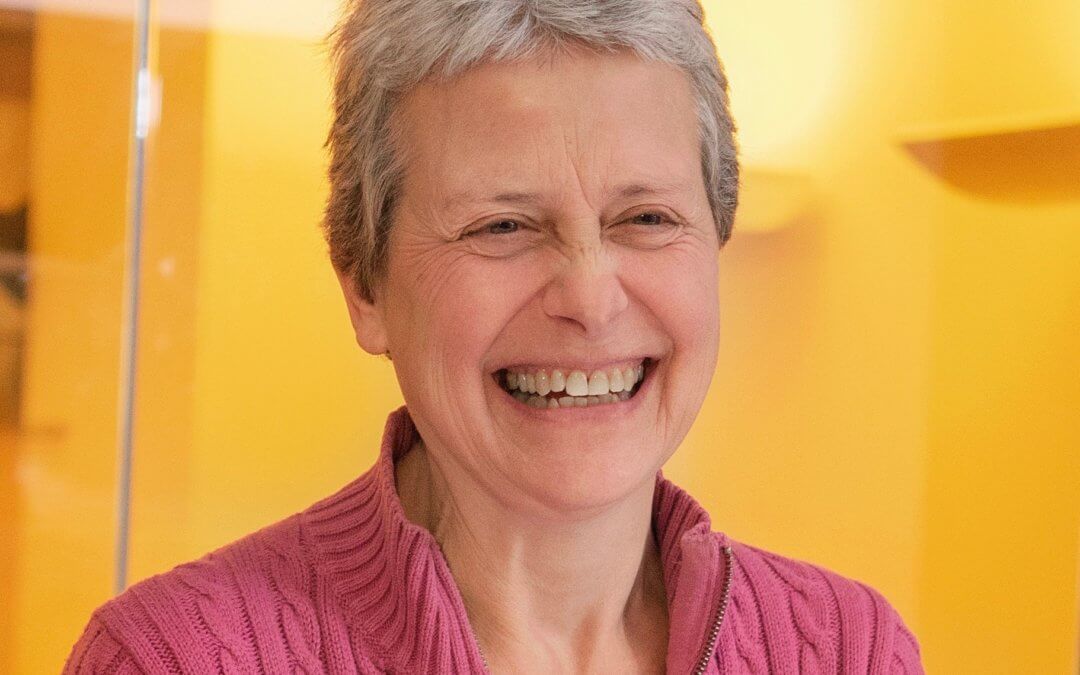
Stefania Mallett | When You Cross Fearlessness & Insanely Helpfulness (Episode 3)
 Stefania Mallett | When You Cross Fearlessness & Insanely Helpfulness (Episode 3)
Stefania Mallett | When You Cross Fearlessness & Insanely Helpfulness (Episode 3)
Stefania Mallet (@StefaniaMallett) is the CEO and co-founder of ezCater, one of Boston’s hottest technology startups. She was just named Entrepreneur of the Year by EY. She has spent over 25 years building and growing technology-enabled companies that solve real business problems. Stefania co-founded and successfully sold InSite Marketing Technology (now NASDAQ: KANA). Her tenure at National Logistics Management (a broker for $225M in transportation services) brought NLM to profitability for the first time in 4 years. At IntraNet (now NASDAQ:TSAI), Stefania revamped the firm and vaulted it to #1 in its market, a position it has maintained for 15+ years. Stefania also operates as a Director and advisor to many for-profit and non-profit firms. She has a BS and an MS from MIT.
“I grew up with two messages. Be a citizen of the world and learn as much as you. And you don’t deserve to live (which wasn’t explicitly said). That combination was quite confusing to me. Took me a while to understand the full effect that had one me.” –Stefania Mallett
“We all are on a journey to be ourselves.” –Stefania Mallett
“You need to understand what motivates others. Reading people is a critical business and life skill.” –Stefania Mallett
“I shut down my company on Thursday, had some cocktails, and then launched ezCater on Monday.” –Stefania Mallett
The Cheat Sheet:
-
Why you should be asking yourself is my company’s solution or product a “painkiller” or a “vitamin”?
-
When do you bootstrap versus take outside capital?
-
What are the three main reasons people become entrepreneurs and why does that matter?
-
What does your last company’s success or failure mean to for your next venture?
-
What matters more the people or ideas or both?
-
What are the three core values in ezCater’s culture that propels the business?
-
How do you become “fearless” and learn to take a leap of faith when you are scared?
-
How do your emotions play into your leadership ability?
-
And so much more…
Scroll down more for a summary, show transcription, resources and more.
“(When you face great adversity or failure) You’ve got to just get back up and pick yourself up. You can’t assume that because one business didn’t work the next one is not going to work. You just think, I’m playing the numbers game My life is my portfolio and I just kind of got to keep trying, keep trying, to keep trying.” This philosophy, persistence, and self-awareness are what has propelled Stefania’s career. It’s what makes her successful, caring, fearless and able to internalize the lessons she learns along the way.
Stefania joins us today to talk about her journey and share the valuable lessons she has learned in leading and architecting businesses. She shares her breakthroughs, breakdowns, and lessons you can walk away using on your journey. Listen, learn, laugh, and enjoy!
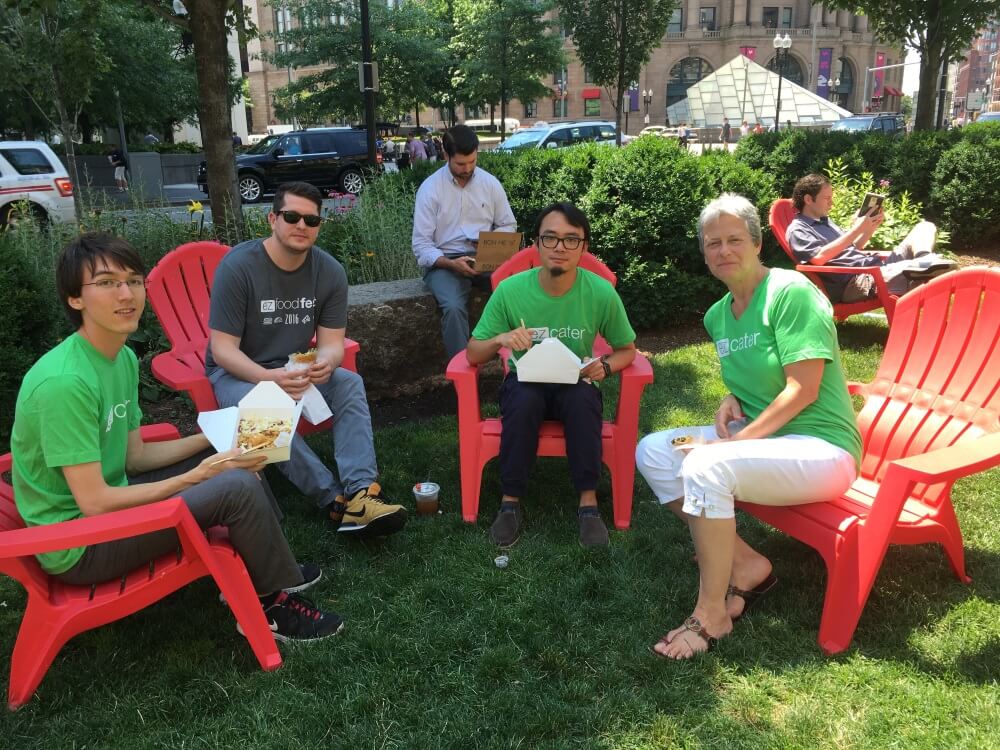

Show Transcript
[Start of Transcript]
Jason: Welcome to another episode of Executive breakthroughs, I have a fantastic guest for you today and you’re going to learn a lot of insights and wonderful information, Stefania who is the CEO of eZcater and it’s a very interesting path she has traveled on and so I want to start off from the beginning because one of the quotes or things I just heard you talk about is that growing up you grew up in a difficult family. I just want to find out some of the people back around where people came from because easier to understand their journey. So, what does that mean, how was growing up?
Stefania: I grew up in a family that sent two messages at the same time. I guess everybody gets conflicting messages one of them is, you’re a citizen of the world there’s a lot of interesting stuff out there you should be out there figuring out how to learn as much as you can do as much as you can. The other message was but you don’t deserve to live and that combination was kind of confusing for me; took me a long time to realize the drag effect that you don’t deserve to live message which of course was never explicitly said had on me.
Jason: How did that play out though because I’m trying to get people like what things happen that told you that…
Stefania: It takes a lot to explain to one game from basically parents who, it was a strong message to turns out there were four us as adults, there was a moment where we all realized that you know we pretty much all came away with that message which is not something that my parents woke up everyday wanting to convey but that right what we got.
Jason: Was a challenging time a girl child with any other people influence you or advance on your path forward?
Stefania: I tell you the biggest thing was when I got out of the house and this exactly exemplifies the conflict. My mother who was a difficult woman, my mother is the one who figured out that I needed to go to MIT and she got me and I mean she arranged it that I applied and I got in and she arranged that I applied I got in and then, the minute I got there and was free of my family the same family that had propelled me into MIT, that was when I really started to become a healthier person from there on.
Jason: It forced on around their own letterhead my hands
Stefania: Got out from under there and flourished on my own.
Jason: What about MIT sort of helped you?
Stefania: MIT teaches everybody how to solve problems, like really teaches you how to use your brain and how to use everything you know and everything you can interpolate, extrapolate from what you know to solve problems. It also has an attitude which I would never have known articulated this way but now, this is a phrase we use here at the it has that attitude of well just try it, I don’t know what not sure if it would work but try it and the just try it.
Jason: Implemented rather than people a lot of times if you notice talking about I just I don’t know start believing it or a yeah and pivot as you go along.
Stefania: I think Engineers have courage because there’s this sense of like I can fix this, I can make something, I can build something, and so that strength and courage permeates MIT.
Jason: So, solving problems in Engineering technical is part of who you are as your [DNA] you figured out that when you’re in MIT or you know that ahead of time where do you figure that along the path?
Stefania: I would give my parents credit for having figured out that I was the kid do type who thought you should be able to make something and who had a I had a certain science and math bent got it and we grew up in Newton which is a suburb or you know not far from Cambridge and MIT My father went to the MIT of Switzerland, my father’s Italian but he went to the MIT of Switzerland and I was the kid most like him and so I think that was the natural path.
Jason: So, how do you find yourself in this entrepreneurial path like where did you come to get your hitch, and where you know your start.
Stefania: I think that entrepreneurs come in three camps. I think there’s the ones who want to prove something to a parent usually to their father [yes]. There’s the ones who need to prove to themselves it’s a smaller group than the first group that needs to prove something to the parents and then there’s another group which is pretty healthy sized which is, I am so sick of working for other people. I just want to quote work for myself. You work for your customers, you work for your Employees, you work for your investors but it feels somehow like you’re working for yourself and I was one of those. It took me 20years of working for other people’s companies before I finally was able to launch.
Jason: What was the event that pushed you finally down this path?
Stefania: so, I am an operating Exec. I’m not the idea person, I’m the one that idea people turn to say can you build this company? I have an idea for a product or you build a company around it. And in 1997, I was approached by or late 1996 I guess, I was approached by IDEA people who didn’t want to quit their day jobs before one of this idea to see the light of day and so they asked me if I would do that and I was in a job where I was kind of sick of it was time for change anyway and I said Sure; why don’t I give it a shot.
Jason: So, what company was that?
Stefania: It’s a company called Insight Marketing Technology, OK We sold that one for 14X. Some investors did better than 14X.
Jason: And it was in a very short period of time right a couple of years?
Stefania: Well 1997, I think we sold it around 2000-2001, I don’t remember, it was that one of them was during the Internet bubble right was a lot of fun people who say the Internet bubble was the era of silliness and we all should have done that they’re like, we had a great time you know great time we’ve all had a great time all of us.
Jason: That was pretty incredible that you got the company interjectory one when you went in there and what is it that you needed to do that wasn’t being done at the time?
Stefania: This was in the early days of the Web; the Web was still the wild west. We helped companies who were just moving into e-commerce create virtual sales people, software that made you feel like you were being helped in a situation and now yes to the best in-store situation you know you walk into a store and you find a salesperson actually knows this is doing it is dispassionate in their advice to you and gives you real help in making your decision, we created a virtual version of that and it made everybody happy, we tripled conversion rates, it was a big deal. It’s a great company I’m working right now technology so familiar with Con us on well yeah then we go above a so yes I have something that is there and then count it in the West Coast.
Jason: So, we wanted this whole process and then you were successful at it and then you started the next venture which was something different so what did you do?
Stefania: Well you ruined once you’ve done, that it’s hard to go back and work for some big company again. I love big companies a lot of strength, a lot of resources in big companies but I found that I like the smaller scenario where what you do has such a huge impact. Your mistakes have much bigger effect; yet your success is so much bigger make the things you did right have much bigger effect. So, I bounced around a bit helping other people I am an operate Exec right, so I was helping other people run their companies or take their companies to the next level people who were plateaued and needed to go to the next level, people who were who weren’t sure how far whether their idea had legs I was helping them and then. In 2004, I got involved with the company that was the precursor of this one. Briscoe Rogers is my co-founder here was the founder of the previous company. He’s an idea guy and he was looking for an operating Exec to help him take his idea forward and honestly at first, I didn’t want to work for the company at first I thought it oh sure problems that are interesting I just don’t know but he kept suggesting people for Him to hire and he kept hiring them and then I thought Oh my friends work there may be better just go work there and so I went.
Jason: Was this preferred time?
Stefania: Preferred time and so he wanted to do for time help pharmaceutical company sales reps get in front of the Doctors. But that’s a very broken dynamic and yes it is happy with the way that it works and we tried to inject sanity and mutual respect into that process and we got to where a third of all the pharm reps in the country were using us for at least some of their visits to some of the doctors that was really cool but still…
Jason: What was the resistance? People paying?
Stefania: The resistance was the pharma firms were kind of torn like well you’re either helping me or you’re getting between me and my customer I can’t decide and we figured out. The cases where people adopted us and felt that was really valuable that worked extremely well but there was the resistance like well are you actually going to slow down my excess or are you helping my access and our investors were at a different point in their funds where they ran out of interest, they didn’t have any more cash to put into the company. So, we shut the thing down. that was pretty discouraging
Jason: But what lesson that you were a man I want to get done how you got to where you are right now what lesson what lesson did you learn at that point you know one number one business that you sold successfully No I didn’t and as well what things did you take away from both experiences moving forward that you were
Stefania: Persistence is important that luck here is part of the game. You’ve got to just get back up pick yourself up and keep going you can’t assume because one of them works and the next one didn’t you can assume because one of the work the next one is going to work and you can’t assume because [a lot of people do] I know but you also can’t assume that because one of them didn’t work the next one is not going to work. You just think, I’m playing the numbers game. My life is my portfolio and I just kind of got to keep trying, keep trying, to keep trying. what in life have I done where every single time I touched some process it worked, oh it’s the same thing. I had an investor the day that we shut that company Preferred Time down. I called all the investors and it was no surprise to them all the employees all the investors knew that it was a very good likelihood that indeed we would have to shut this thing down and when the white knight prospect of investors didn’t materialize, we close that down pretty quickly. And I called the investors to say look I’m sorry I lost your money, this is the way the game is played I’m thinking this but still I felt terrible and the 4th or 5th guy whom I called said That’s OK Stefania, I’ll do whatever you and Briscoe are going to do next. I’ll invest in whatever you want.
Jason: But why do you think you do next he said that I saw you mention that I said
Stefania: Absolutely blew my mind and I remember still very clearly I remember feeling this weight come off my shoulders and he said to me well I was silent because I was feeling the weight, he said What is that next thing by the way and that’s when I realized people really invest in people more than the idea that I was heard people say an A-idea with a B-team is not as good as B-idea with an A-team that the team is what matters and clearly we were being respected for what we had accomplished even though the company was not successful.
Jason: The relationships also that you built with all of these people that want a better
Stefania: I think relationship mattered but I think it was more the way they all served how we performed OK. it’s not like we were best buddies and that they would have sold their first bond to fund our next come, [Got it] was more that they saw that we had performed as well as well as we could and how we had before was pretty reasonable. and the message that I took away from that was at that moment he reminded me of failure is the deal for an entrepreneur it’s OK failure is part of the game. I had to sort of know that intellectually but when he said it in those words emotionally I resurrected that concept of oh yeah, it’s OK it’s OK when it happened and I moved all had to be the joke but it’s actually not a joke is that you shut those things down the Thursday like I got drunk Oh we can do it on Monday we launch this thing. You know take yourself back up.
Jason: What do you think if you would have gotten away with it [part of the process] and you made peace with what had happened recently. You know I was reading somewhere that the arc of being a successful entrepreneur or is really more about knowing when to kill ideas and move forward and I’m wondering if you would have had that white knight come in would you have can would have continued? Would you have continued on or not I mean I know, that a hypothetic question.
Stefania: It’s I’m a little cut and [yeah[ I mean that certainly was what we’re looking for the white knight for we certainly thought the business had legs in hindsight I see that it was a tough business, a really tough business Iine a way much tougher than the one we’re in now the one we’re in now, The difference is that people were clamoring for the kind of assistance [that Easy cater] provides in the in preferred time, it’s like almost every other business I’ve ever worked for, there was a need but people aren’t clamoring for a solution to that need.
Jason: There’s not massive pain.
Stefania: There’s pain but it wasn’t such a strong pain there were all desperate for it and for a solution to that pain and so many companies are built quite successfully convincing us that the pain is really great and that we should buy this.
Jason: Yes, and instead of solving that the pain is there now because you found that right idea you found in the business you have now in the preferred time.
Stefania: We had literally thousands of people attempting to place orders, literally thousands of times we were asked, can you make the food appear for this business meeting, and we thought two things, we thought what we can bootstrap this thing and it’s a real need. So, let’s figure out how to do that. And so, we did we launched the thing again out of our house.
Jason: And you did in our Monday. So, I mean how did you how did most people take their wounds for a little while I know you’ve had that conversation the sense a very was that really just for you was that just a simple, getting the weight off your back?
Stefania: I think when you went over there a bit was that was it continue to work OK but also admittedly it was the beginning of summer and with that summer, we worked but we didn’t work balls to the wall 24hours a day over we did I know we were waiting to try to released software we’re waiting to try to have all the pieces lined up and I would say I work probably 30hours a week that first summer OK so I did take some time to just kick back a bit
Jason: And you had investors lined up or people that would give you money?
Stefania: Yes, we did but it was very small money you know Briscoe and I each put in, I don’t know I think together we put in $25,000 or something $22,000 and we raised $100,000 more from people like this investor who said I’ll put in money, we didn’t pay ourselves the first year or more of their surroundings model really bootstrapped. I remember the discussion about when winter came and we were still working in my house I said you know if I went to a job I would heat the house during the day I have a timer thermostat to be charged the company the heat bill and we decided that yes I could charge the company in the heat bill that was. For the part of the week for 40hours of the week that Monday-Friday, 9-5, If yes so we were back kind of careful about using the money we didn’t feather our own mess with it at all.
Jason: there are two schools of thoughts and then a bootstrapping it. And then there are people that are taking L-side capital, like how do you view that starting a company from infancy point of view because people probably listen to this and you know we have successful people.
Stefania: Your idea OK you know if you’re building a drug you need huge amount of money and bootstrapping is not an option. If you’re building a service, if you’re building a consulting service, if you’re doing software for hire, you probably can bootstrap that and then all the other ideas are somewhere in between on that spectrum. I think that it’s wise to not have a lot of money early on because it makes you be really creative and clever about what you’re about how to accomplish what you need to accomplish and it makes you be pretty ruthless about what’s important to work on first and I think that gives you a sharpened focus. So, I think never not having too much money is a good move at every stage of the company, and we’ve always raised only as much money as we knew what to do with we think that’s a wise discipline. I think also. Frugality breeds creativity, resourcefulness and I think that’s helpful I think it helps to be a little scared all the time I. Think that’s sharpens of the senses, there is a motivator.
Jason: Fear is a motivator.
Stefania: You do if you’re too much like everything else if you sue much then you end up unable to get out don’t get overwhelmed and you can’t really try anything in hindsight, I think we bootstrap for about a year too long. I think we were we could have brought in bigger money earlier but boy that day we brought in the big money, I mean to us at first $1million dollars raised it once was big money and then we raised $2-million at once it seemed like incredible and then $3million at once and then we raised $13million at once and while we could try a lot of experiments at that point and going fast, which is what with enough money you can move faster which was Hope money letting you move fast gives you a quicker learning cycles because that’s all this is about yes constantly learning and learning and learning and doing incorporate learning said moving quickly money helps you do that move when you’re ready when your ready money helps you move faster to get to be ready and yeah you can just everything the way in the beginning and people in place and of people that you can bring in more good people.
Jason: So, what did you want about hiring people because I’m interested in you know on Company Number three how has your hiring process or philosophy changed over time and what do you learn that’s kind of the secret source to finding the right people.
Stefania: so, I have over time I think I’ve developed my gut pretty well I think the big change is I try to listen one hundred percent to my God. To the collective guts of all the people who interview, I do not do the interviewing alone I don’t interview every day I don’t if I don’t even interview all the employees anymore I have people who have trained their guts that we have a group consensus and if someone if anybody in the group says I think so this is not like somebody that makes me go yes this is our kind of person and they have the skills, then we don’t hire you’ve got to have somebody in the group is really negative on an individual if the majority opinion is that there’s very strong Yeah this look oh my God this is a really a real keeper that we don’t hire and we’ve hired pretty well.
Jason: So how do you want to trust your gut because a lot of people get different and basically look at the data you know look I’m sorry they’re right people want that right also the godson right so how did you measure it was there any is there anything that happened that got this moment that you reflect on that sort of taught you to trust in yourself more.
Stefania: One of the great advantages of growing up in a difficult situation is that you learn to read the tea leaves you learn to be very sensitive to nuance to understand what’s really motivating this person because in my family if you didn’t figure out what was motivating your parents. You were going to die, not literally but it certainly felt like it yeah and so you learned to be pretty attuned to and to nuances of situations of human beings. Harnessing that has been very helpful you harness to understand how you couldn’t treat a customer really well, you harness that to figure out how you can be hire people well, so see reading people as a life skill. Everybody can develop it but if you develop it under fear of death when you were little you probably developed greater probably got a faster you know I need to tell you that out and just look at your time.
Jason: so, what do you want also a building culture, like what does culture mean to you because I feel like that’s a lot of work for some people but I’m seeing a lot more and a lot more people are really putting a lot more emphasis on that now building process and in the D.N.A. of the company culture matters hugely I mean everybody has one I remember just recently I was at an event where somebody said you know we don’t think we had a culture we went offline for a couple days and we decided what our culture would be I said well you actually have a culture, you always have a culture you could go outside and decide what you want to change it to if you don’t like the one you have but you’ve got a culture ours is pretty intentional from the start. I have cared about and Briscoe my co-founder has completely supported has agreed with he cares about the same things I cared about transparency about. Try it you know fearlessness let’s just try stuff and honestly he’s more Felix than I to his He’s amazing you guys like how hard can it be and I’ve been through the more cautious voice and I think the combination has helped us and I’ve become more and more brave over time following this guy around the bike he still lived let’s keep trying more things so transparency, fearlessness and Being insanely helpful to each other to our customers, to our caterers were two sided marketplace and so we need to support both sides equally well you can’t be emotionally available to be that supportive to your customers and your business partners if you’re not being well treated so being insanely helpful to our employees and each of us to each other and I to each of them that’s of course tenet of our culture too. I didn’t wake up one morning saying these are the three things I just that’s the way I behave and every year as we brought in more employees we realized we had to articulate more clearly that these are the behaviors and we’ve kind of distilled it to those three. Because that’s genuinely who we are and because it helps to say it out loud.
Jason: Got it, what 3-things?
Stefania: Transparency, fearlessness insane helpfulness [OK[ if you put those together, you know insane helpfulness is another phrase for just really nice to each other. In a proactive in a thoughtful way, fearlessness is try it, try it and track it. Because if you track it then you figure out whether that was a good thing to try whether time to change it pivot just do more of it and tracking it also improves the sense of psychological safety, it is my idea, I don’t play the founder card very often it isn’t that I yell loudly it’s that the data said this was a good idea of the data said this was not a good idea and that doesn’t matter whose idea was let’s keep going to do something else. So, transparency fearlessness with data to back it up and, it was my third one here there’s transparency, fearlessness and helpfulness yeah, those are my three.
Jason: So, the other part about you meeting you in just wondering about your past, I can see that probably caring and empathy is a huge piece of who you are and so I wonder how that’s reflected in the culture because I find it so I can psychological safety that’s a key component of making that…
Stefania: It’s true, I heard of it so I think I can people I like people who think coming out of a difficult time I know you can’t tell you that you can’t kill things that people are born with I was born industrious, I was born liking people, I was born optimistic and you can’t kill that in people. I don’t think you could borrow it but you can’t eventually it comes back and I actually come back out I’ve spent my whole life trying to become more and more myself I think we’re all on a journey to being ourselves Yes and it turns out myself is industrious and caring and genuinely people and optimistic so everybody who works here. If the people who are successful here are people who are like that.
Jason: Everyone is also right themselves out there somewhere they don’t are they are they don’t want to join you can join every C.E.O. has their own their own culture, has their own personal style, their own personal sense and you either match with that or not. I remember a long time ago, the first time I inherited a group I realized, wow it’s a very good manager who could manage a group and Harrah’s as opposed to a group that they’ve built that have selected Yes and that they have selected for themselves so that’s a real skill.
Jason: So how do you know working with a co-founder because I know you’ve got a very close relationship how do you resolve conflicts with a lot of people who start a business together one of the things that implode them is the people that found the business end up either buying one or out or they just can’t work gather and the business sinks I know
Stefania: My job is that the company’s founder on the rocks of the founders are going with each other yes. We’ve been, we’ve done really well we are this is the third year we’ve been on together actually. I got involved he is the idea guy had helped found a company with a different co-founder and they were running into some trouble and they and one of their investors said you need to upgrade here I’m a little further along in my career the Briscoe was not that much further but further and so, I came in and tried to help with that one we didn’t manage to succeed in saving that company but we discovered that we have complimentary skill sets and we love the same values. We have different angles, and we solve the same problems from different angles and they get their complimentary we have nothing to do with each other outside of work and we joke about it if we ever talk politics or get into trouble but it turns out. I’ve known the guy longer than I’ve known my husband I mean yes, I’m on my second husband so I’ve known him longer than know my husband he’s known me longer than he’s known his wife. We are the lucky combination of sufficiently different that you have two brains working on things and sufficiently the same. That we don’t get into fatal fights, we’ve certainly had disagreements but we’re both Engineers we both go back to the data and the data has resulted a lot of issues it was a great day when we had enough volume going through the system that we could just test it we didn’t have to argue about like should the button be blue or should it be red and we could just test it and the market was said one of them was a better color and the breadth of the best thing was neither Briscoe or I could remember was the blue button your idea or bad idea; because neither of us cares either of us hold quite so easy go in as even you go to drain checking a good yeah we’re both pretty separated from our egos.
Jason: So, what do you think makes a great leader from a good leader where you think separates out as you look at yourself and other people I mean what is it that you would hold out there as well as a cleaner ships’ the key for getting this thing where you want to go yeah.
Stefania: I think there are two things I would say matter and that’s probably a fifty but I’ll pick two one is, leadership is being able to stand back and see the bigger picture, see I always use this phrase with my people I say look pull the lens back, now as your become a more senior manager pull the lens farther back the more senior you are the more you should pull the lens farther back with your manager leader pull the lens farther back so that you can see the bigger picture see more where we’re going think about the more strategic dimension that’s one thing. And that’s kind of more on the skills level. I guess on the there’s an emotional dimension too. I think leaders really care about people I think. The company isn’t what matters, the people that are and yet you have the people matter in order to build a company because the company is this enabler or for people to get to a better place the work is enabling and I think giving people better work to do giving people jobs they really want to have is a powerful, Powerful force it’s what I actually care about the most, I think all work done well is magnificent. It doesn’t matter if you’re flipping burgers if you do it well it’s magnificent and is terrifically interesting do whatever you’re doing well and it becomes terrifically interesting and so I think a leader embodies that with him in trying to articulate what excellence looks like and helping people get to that excellence.
Jason: So, last question for you would something that you struggle when you’re trying to get better and you know as far as being a leader you know what are your views or are you now sort of learning or trying to figure out to take it to next level because obviously there’s a lot of things you’re doing excellent training but we’re always as you know pulling leaders that are doing that we’re now in a learning and grow and trying to get better or worse so we’re because people always want to know that they see the highlights but I was like I don’t know what they’re weeks but what are the I know well but I think more of just the things that you’re learning a lot about yourself and growing because it’s evolution is an important part of…
Stefania: fearlessness you know I talk about transparency I’m pretty good at that talked about insane helpfulness I’m pretty good at that the fearlessness I continually working on that, I find myself continually having to say no you stretch higher, go farther you can do bigger, bigger or pull my own lens back so that’s the one that I think of those three that I work on the most. I look very confident and I can talk very confidently but then it really, I’m like to go with. And that and then I pull yourself together well but then I go up there and I get I look really confident I do really big stuff and thinking oh my God do them figure that out yet how do you know I have imposter syndrome like everybody else does that every leader has it so what is it.
Jason: what do you do to help yourself make that leap of faith in order to be more fearless is there something that you think in your head or something that you do?
Stefania: There’s two things one is a use data I think. You have had a lot of success up to this moment yeah, I think you can you know it look at everybody else they’ve all fallen down a few times and they’ve done OK if you’ve gotten here and if they did that, why can’t you? So, use the data of other people’s experiences as well as my own life history. And the other thing is. This is something I get it from my co-founder. Briscoe Rogers has the opposite of he doesn’t think you deserve to live Briscoe has a core that the lighter uses you know that that clown that you got when you were a kid that you can whack it no matter what happened to bounce back up Briscoe’s like unshakable in his core and I thought I want to be like that so I watch, I watch him I think unshakable Core, you can do it and shakable core is not the only one of my life that I’ve seen like that but I see him every day, so it’s a good example to Reminder for a constant reminder.
Jason: Wonderful thank you for joining us today and it’s another new show of executive breakthroughs and we had a lot of insights, a lot of very excellent show today and thanks for coming.
Stefania: Thank you it’s great to be here thanks a lot.
[End of Transcript]
In This Episode:
- The impact her parents had on her
- How going to MIT was a turning point for her & what was the biggest lesson she learned (that will help you!)
- Why the core values of transparency, fearlessness, and being insanely helpful drive their culture and success
- How can you learn from your failures? (She gives an example from her company)
- Why building relationships it’s essential to your success
- What is ezCater’s driving motivator in hiring
- Why frugality breeds resourcefulness
- Why you should leave perfectionism outside the door and instead look to the data and pivot based on experience
- What is leadership
- What skill set is Stefania trying to develop more of and how it can help you
Couple Key Takeaways (pre-interview)
Before the interview, we discussed a few ideas and I wanted to share them with you because they can make a big impact in your business.
(On Culture #1): We made the choice from the start to deliberately build a culture of insane helpfulness. I can’t say that we use that phrase. We didn’t articulate that into those two words. We focused on providing fantastic customer service to both sides of our marketplace. We’ve always taken both sides of our marketplaces equally seriously.
(On Culture #2) You can’t deliver excellence unless you create a culture where the employees feel as well supported as is humanly possible. If I am emotionally drained, I don’t have anything to give to anyone else. If I’m emotionally nourished, then I can be very caring, helpful and look out for them. From the start, we treat our own people with the same caring, concern and same excellence as we do to anyone outside the company. I’ve often thought, “How can you keep this wonderful culture as you get bigger?”
(On Hiring) We keep our culture moving in the right direction if we have done the right job of hiring people who value and care about our culture (and three core values). We’ve been able to model it in such a way that each one is a steward of the culture to the point that the bigger we get, the safer our culture is. We figured out how to ensure that each person picks up their responsibility in maintaining the culture.
Quotables:
“Many companies are built on the rocks of co-founder’s arguments.”
“Engineers have courage. I can make something. I can fix something. They have that strength.”
“I’m an operating executive. I’m the idea people come to and say ‘Can you build this?’”
“Took me 20 years working for other people before I started my own company.”
“Once you are an entrepreneur you are ruined, you can never go back. Why? Your successes have a much bigger effect. So do your mistakes.”
“As an entrepreneur, persistence is important, luck is part of the game, you have to pick yourself up and keep going.”
“I’m playing the numbers game, and my life is my portfolio. I’ve got to keep trying and trying.”
“MIT taught me to ‘just try it’. So now, that’s core to our culture at ezCater.”
One of her favorite quotes:
Archimedes saying, “Give me a long enough lever and a place to stand, and I can move the Earth.”
‘Remember, in his day that was a completely bonkers idea. I would say to him, “Where did you get the clarity and the courage to say something so earth-shaking (pun intended!)?”’
Interesting fact: She knew the famous comedian, Louis C.K. growing up.
THANKS, STEFANIA MALLETT!
If you enjoyed this session with Stefania Mallet, let her know by clicking on the link below and sending her a quick shout out at Twitter:
Click here to thank Stefania Mallett at Twitter!
Click here to let Jason know about your number one takeaway from this episode!
References Mentioned:
- Stefania Mallett – LinkedIn bio
- ezCater – They make it easy to order food online for your office. From routine office lunches to offsite client meetings, from 5 to 2,000 people, we have a solution for you. ezCater connects businesspeople with over 50,000 reliable local caterers and restaurants across the U.S.
- MIT
- Briscoe Rodgers – President & co-founder of ezCater.
- Get a glimpse into the ezCater culture
Biography:
Stefania has spent over 25 years building and growing technology-enabled companies that solve real business problems. Stefania co-founded and successfully sold InSite Marketing Technology (now NASDAQ: KANA). Her tenure at National Logistics Management (a broker for $225M in transportation services) brought NLM to profitability for the first time in 4 years. At IntraNet (now NASDAQ:TSAI), Stefania revamped the firm and vaulted it to #1 in its market, a position it has maintained for 15+ years. At a dozen companies, she has held general management, marketing, sales, product management, support, and technical positions. Stefania also operates as a Director and advisor to many for-profit and non-profit firms. She has a BS and an MS from MIT.
On your phone? Click here to write us an iTunes review and help us reach and help more people!
 Jason Treu is an executive coach. He has "in the trenches experience" helping build a billion dollar company and working with many Fortune 100 companies. He's worked alongside well-known CEOs such as Steve Jobs, Mark Hurd (at HP), Mark Cuban, and many others. Through his coaching, his clients have met industry titans such as Tim Cook, Bill Gates, Richard Branson, Peter Diamandis, Chris Anderson, and many others. He's also helped his clients create more than $1 billion dollars in wealth over the past three years and secure seats on influential boards such as TED and xPrize. His bestselling book, Social Wealth, the how-to-guide on building extraordinary business relationships that influence others, has sold more than 45,000 copies. He's been a featured guest on 500+ podcasts, radio and TV shows. Jason has his law degree and masters in communications from Syracuse University
Jason Treu is an executive coach. He has "in the trenches experience" helping build a billion dollar company and working with many Fortune 100 companies. He's worked alongside well-known CEOs such as Steve Jobs, Mark Hurd (at HP), Mark Cuban, and many others. Through his coaching, his clients have met industry titans such as Tim Cook, Bill Gates, Richard Branson, Peter Diamandis, Chris Anderson, and many others. He's also helped his clients create more than $1 billion dollars in wealth over the past three years and secure seats on influential boards such as TED and xPrize. His bestselling book, Social Wealth, the how-to-guide on building extraordinary business relationships that influence others, has sold more than 45,000 copies. He's been a featured guest on 500+ podcasts, radio and TV shows. Jason has his law degree and masters in communications from Syracuse University

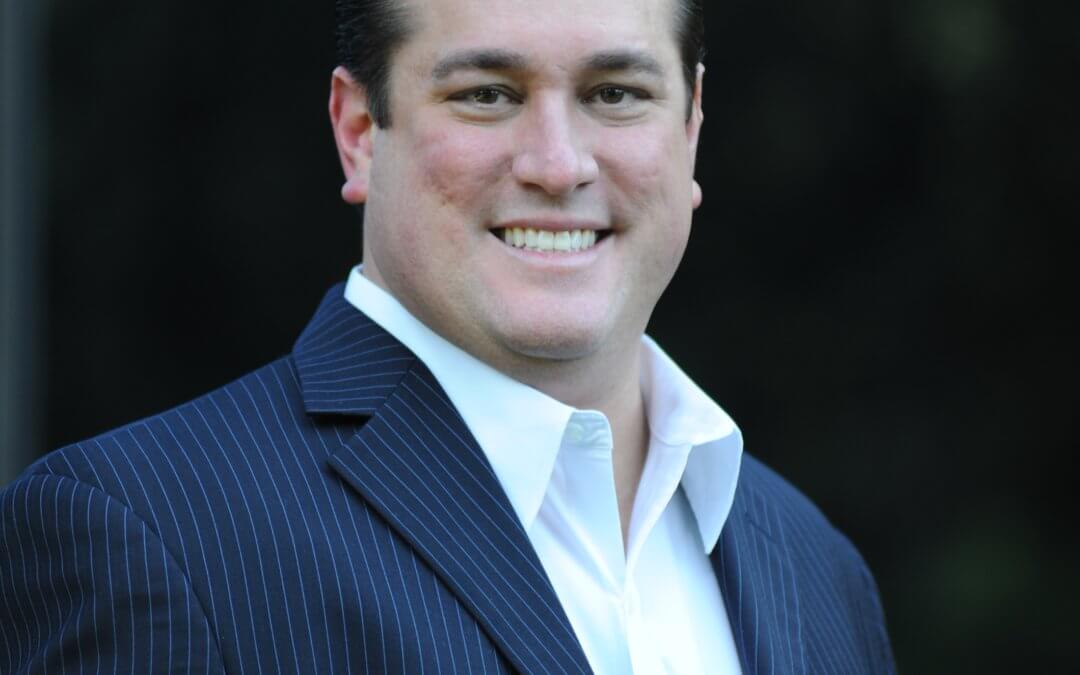
 Brent Brightwell (@doublehorn) is the Senior Vice President of Products & Strategy at DoubleHorn in Austin. Brent Brightwell is a Technology Leader and Entrepreneur with extensive Startup, SMB, and large Enterprise experience. He is currently the SVP of Products at DoubleHorn where he is responsible for R&D, Product Management, Marketing, Alliances, and Strategy. Prior to DoubleHorn, Brent held positions such as CMO of Artisan Infrastructure, VP of Products for Gravitant, and Product Marketing Executive in the HP Helion Cloud organization. Brent has also led Global Marketing and did Technical Pre Sales for the HP Software Portfolio. Prior to Sales, he led R&D and Product Management for HP’s strategic Solutions.
Brent Brightwell (@doublehorn) is the Senior Vice President of Products & Strategy at DoubleHorn in Austin. Brent Brightwell is a Technology Leader and Entrepreneur with extensive Startup, SMB, and large Enterprise experience. He is currently the SVP of Products at DoubleHorn where he is responsible for R&D, Product Management, Marketing, Alliances, and Strategy. Prior to DoubleHorn, Brent held positions such as CMO of Artisan Infrastructure, VP of Products for Gravitant, and Product Marketing Executive in the HP Helion Cloud organization. Brent has also led Global Marketing and did Technical Pre Sales for the HP Software Portfolio. Prior to Sales, he led R&D and Product Management for HP’s strategic Solutions.
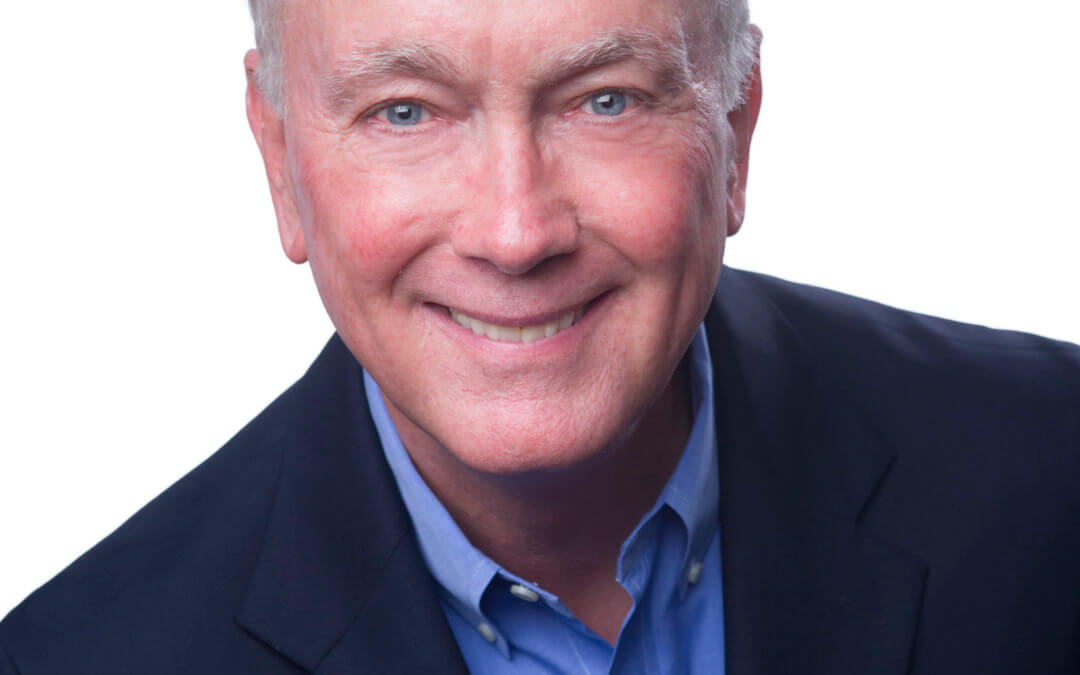
 Ron Nash (
Ron Nash (